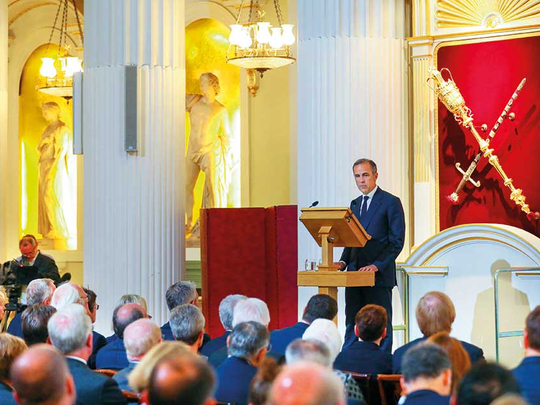
London
Mark Carney ended more than a month of silence with a major speech that pushed back against rate hawks in the Bank of England and re-emphasized his concerns about the impact of Brexit on the economy.
The UK’s exit from the European Union was a central theme of his address on Tuesday, with the BoE governor highlighting the risks it poses to consumer spending, business investment, the current-account deficit and the financial-services industry. He indicated he’s in no rush to raise interest rates, saying he wants to see how the economy responds to the “reality of Brexit negotiations.”
Carney’s speech in London’s financial district opened with a homily on the “hope and despair” that has faced a Britain hit by terrorist attacks and a devastating tower-block fire in recent weeks. He said the best response London and the country can give is to “renew our shared commitment — whatever our differences — to promote the common good.” This includes a Brexit that “works for all.”
The dovish view on interest rates came less than a week after the Monetary Policy Committee’s latest meeting, where a minority of three members unexpectedly voted to raise the benchmark rate from a record-low 0.25 per cent, saying a surge in inflation outweighs the risks to growth. MPC member Kristin Forbes told Bloomberg on Monday that the central bank is underestimating inflationary pressure and there will be a cost if it waits too long to react.
The governor, who voted with the majority to leave the rate unchanged, refuted that view, saying domestic price pressures are subdued and wage growth anaemic.
“Now is not yet the time to begin that adjustment,” Carney said in the speech at the Mansion House, which had been delayed from last week because of the Grenfell Tower fire. “I would like to see the extent to which weaker consumption growth is offset by other components of demand, whether wages begin to firm, and more generally, how the economy reacts to the prospect of tighter financial conditions and the reality of Brexit negotiations.”
Pound falls
The remarks sent the pound lower against all its major peers. Sterling fell as much as 0.5 per cent to $1.2668, the lowest level in a week. Having been out of the limelight because of the silent period before the June 8 election, Carney’s comments were his first since Prime Minster Theresa May weakened her position by losing her party’s majority in Parliament.
“Before long, we will all begin to find out the extent to which Brexit is a gentle stroll along a smooth path to a land of cake and consumption,” Carney said. “Depending on whether and when any transition arrangement can be agreed, firms on either side of the channel may soon need to activate contingency plans.”
Carney spoke at the same event as Chancellor of the Exchequer Philip Hammond, who put protecting financial services at the heart of his plan for Brexit as he seeks to shift the government’s focus away from controlling migration to safeguarding jobs.
The speeches came a day after the start of talks to leave the EU, which saw British negotiators give in to demands to discuss the terms of its divorce — including the exit fee — before any consideration can begin on a future trade deal. The BoE has said it would favour a smooth transition to its new relationship, avoiding a so-called cliff edge.
Trade Deficit
Carney also renewed his warning about Britain’s current-account deficit, saying that its sustainability “remains an open question” even after the pound’s depreciation. The answer “depends crucially on the outcome of the Brexit negotiations,” he said.
While the governor’s speech will be hailed by many of the business groups campaigning for a more gradual divorce from the EU, they are likely to irritate those overseeing the talks. Carney, who has already stoked controversy for previous comments seen as overly-political and clashed with lawmakers over interest rates and his assessment of the economy, ended his speech with a plea.
In comments about protectionism that also have relevance to the Brexit talks, he said that raising barriers to trade “disproportionately hurts the least well off through higher prices and fewer opportunities.”
“The Brexit negotiations will be the test,” Carney said. “May the hundreds in this room pass it by working towards innovative, cooperative and responsible solutions to the benefit of the tens of millions outside.”












